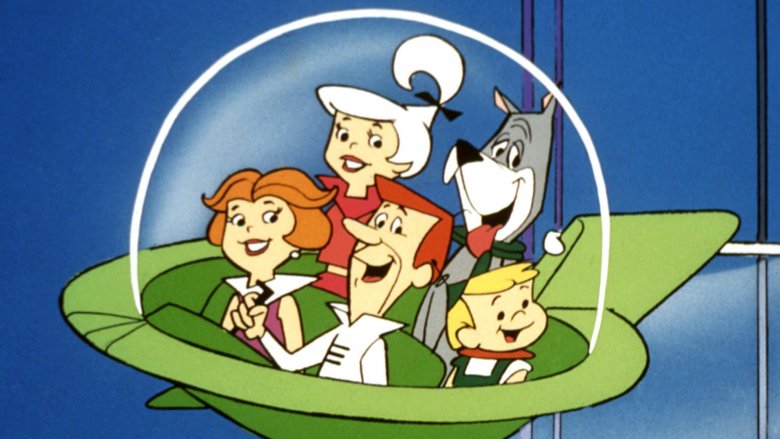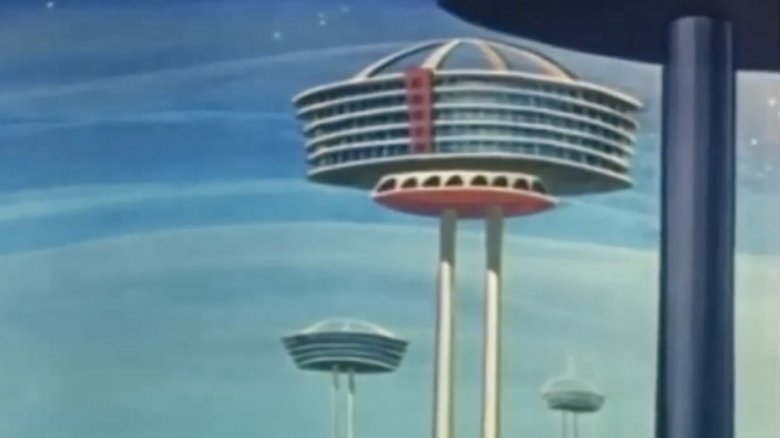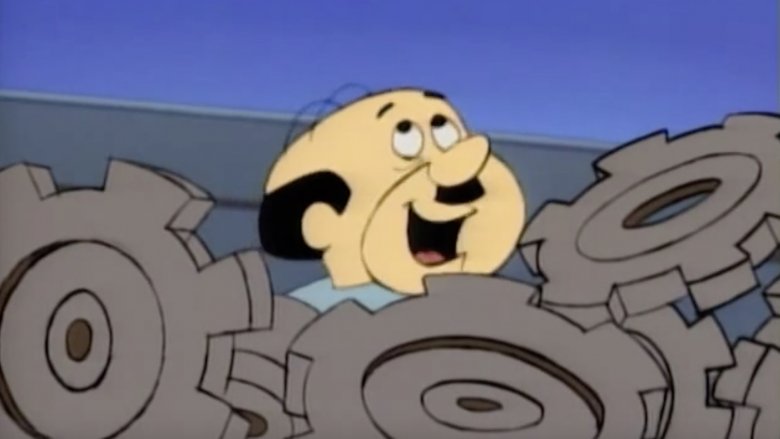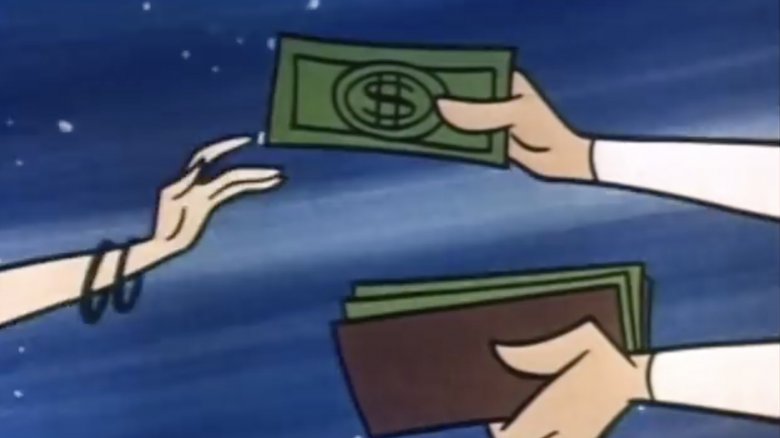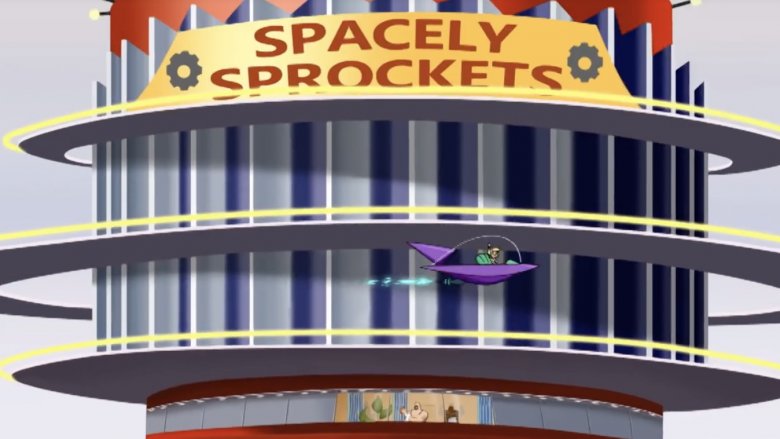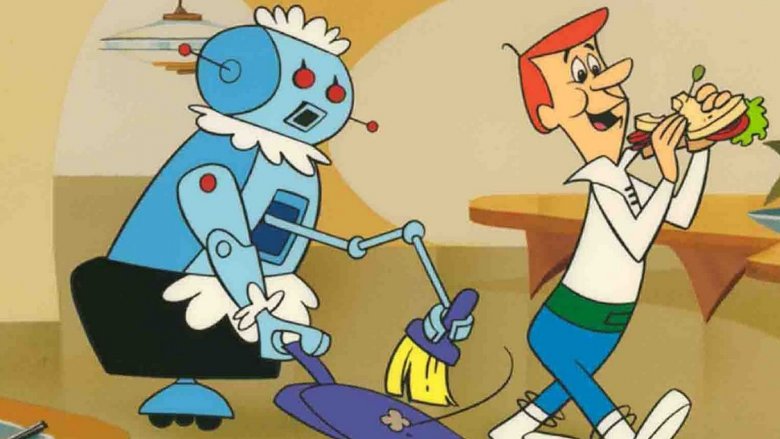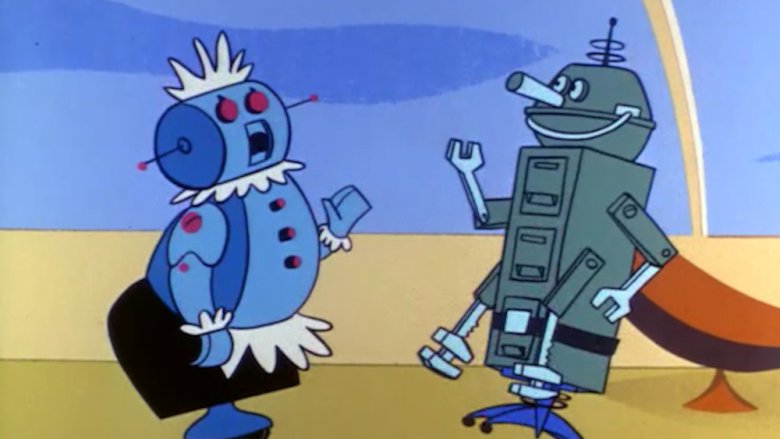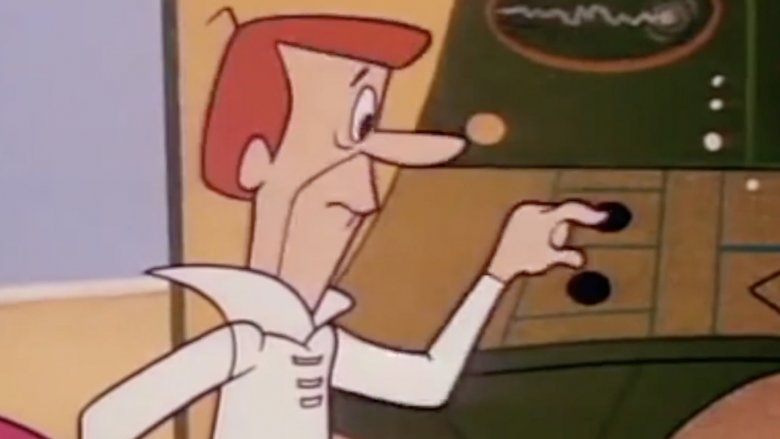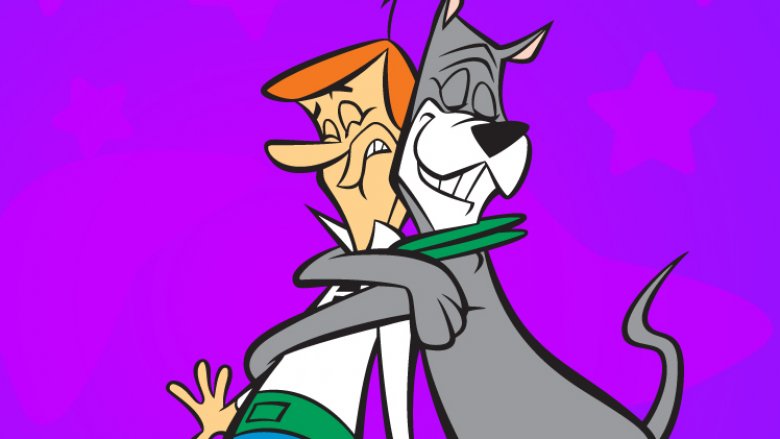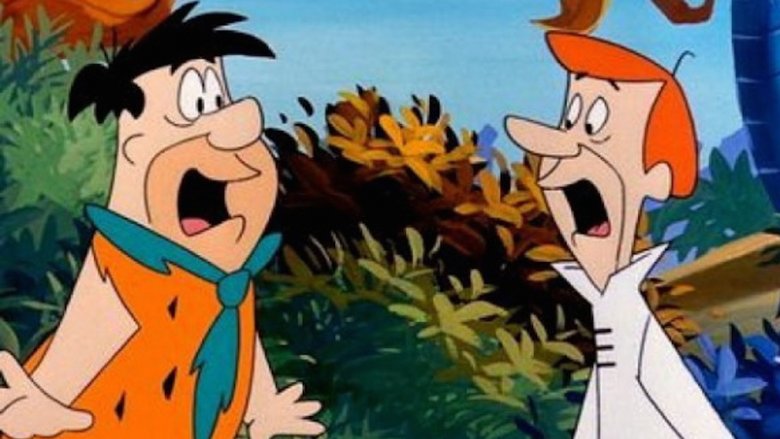Things About The Jetsons You Only Notice As An Adult
In the early 1960s, Americans had a bad case of "future fever." That manifested in things like the futuristic 1964 World's Fair and The Jetsons, a dazzling primetime animated series set in the far-off year of 2062.
After a single season on ABC (1962–63), The Jetsons was canceled, but turned up with new episodes in syndication in 1985, once again delighting and enthralling kids with tales of what the future held. Towering buildings, food pills, sassy robots, and flying cars were life as usual for George Jetson, his boy (Elroy), daughter (Judy), and Jane (his wife). But was The Jetsons really that innocent and progressive? There are some dark and intriguing things a viewer might notice about The Jetsons after acquiring a little of the wisdom (and bitterness) that comes with age.
There has to be a dark reason why all the buildings are on stilts
To a kid, it's endlessly cool and sophisticated how all the buildings in the Jetsons' hometown of Orbit City stand high in the sky on stilts (which makes flying cars to get from place to place a necessity). Nobody ever seems to set foot on Earth's actual surface. This suggests something very bad happened to the planet sometime before 2062—likely a massive, planet-wide environmental catastrophe. All the problems that have ravaged the Earth in recent years, such as the hole in the ozone layer, the melting polar ice caps, rising temperatures, pollution of all kinds, and floating garbage islands must have come to a head that forced humanity to take to the skies. The Earth's surface is probably uninhabitable due to worldwide flooding, overwhelming trash piles, or worse. If The Jetsons ever showed the ground, viewers might see WALL-E puttering around down there.
The show got 'the future' very wrong
Watching The Jetsons as an adult as well as someone who lives in the bona fide futuristic year of 2017 gives perspective on how much about "the future" didn't pan out. For example, George Jetson works at Spacely Space Sprockets; its chief rival is Cogswell's Cogs. Jetsons writers banked on domestic factory-built moving parts to be the engine of advanced, space-age technology. In reality, all of our gadgets run on tiny computer chips and digital technology that's built overseas. Also, we're still waiting on a real-world Food-a-Rac-a-Cycle, the Jetsons' fully automated food preparation machine. Sure, we've got loads of processed foods to choose from, but we still have to buy them from a store.
They don't have a cashless society
To an older viewer, the stuff about The Jetsons that isn't futuristic really sticks out. First of all, there's the sexism—in the opening credits, George tries to give his wife, Jane, an allowance before she zips off to the mall. She steals his whole wallet instead, because, as a '90s stand-up comedian might say, "Women be shopping!" Ha-ha? Funnier than the fact that tired gender roles and stereotypes apparently haven't been eliminated by 2062 is how George and Jane still use cash. Orbit City has sentient robots and dream manipulators, but people have to buy that advanced gadgetry with filthy dollar bills? Meanwhile, the actual world in the year 2017—what with debit cards, Apple Pay, and Bitcoin—moves to an increasingly cash-free economy.
Space-age character names mean they abandoned history and cultural identity
The Jetsons is so futuristic that its characters seem to have abandoned all traces of the past, including their cultural heritage. The show's commitment to a space-age setting means almost everyone has last names like "Jetson," or "Spacely" or "Orbit." Was there some kind of government purge of "the old ways"? That would explain why nobody is named "Johnson," "Sanchez," or "Nguyen." In came the new names, and out went the old names and the cultural identities they represented.
Robots are enslaved
The Jetson family's robot maid Rosie (also sometimes spelled "Rosey") is the most prominent automaton on The Jetsons, and she represents an entire electronic working class. On The Jetsons, robots are machines and are treated that way, even though they're almost human. Rosie frequently gets sad, stressed out, and overjoyed—she acts like a person, but doesn't have the rights of one, doomed as she is to work for the Jetsons forever. Rosie, and millions of other robots like her, are essentially slaves in the "progressive" world of 2062.
The robots have sex
Rosie may not get out much, but she does have a boyfriend: Mac, the robot assistant of Henry Orbit, the Skypad Apartments janitor. Not only does this mean that the robots on The Jetsons are so advanced that they feel love—and feel the need for love—it also means that they have the need (or are programmed to feel the need) to express that love in a physical way. This means the robots in Jetsons world definitely have sex. But have they been programmed to do it, or have they developed that quality on their own? Either possibility is scary.
George Jetson's work schedule is ridiculous
On almost every episode of The Jetsons, George Jetson returned to his deluxe apartment in the sky, tired and world-weary from a day of boot-licking and hard labor. Kids might miss the subtle comedy of George complaining about his work, because his actual job was to press a button over and over. Also, George works "full time," which in 2062, means three hours a day, three days a week. He should really stop complaining so much, because Mr. Spacely could easily replace him with another human worker, or, let's be honest, a robot.
Outdoors is a terrible place for a hovering treadmill
In a scene that played over the end credits during the '60s run of The Jetsons, George walks Astro the dog on an automatic dog-walking machine—basically, a treadmill. Astro spots a cat, which makes the dog walker speed up, and George desperately struggles to stay on while calling out, "Jane, stop this crazy thing!" To a kid, this is merely some funny physical comedy. An adult might read it as a subtle comment about the dangers of technology run amok. Also, it shows viewers that George Jetson is quite dumb. Why would anybody place a hovering treadmill outside? No wonder George is so scared of falling off—if he does, he'll plummet to the ground and die.
No one is impressed by a talking dog
Another thing George Jetson has that we don't: a talking dog. Be it the result of science or nature, that's an amazing breakthrough. But nobody on The Jetsons seemed fazed that Astro the Dog can talk. This shouldn't just gobsmack them at first, but every time they hear Astro speak English words (even if it is in a dog-like way, adding a ruff-like "rrr" to most every word). Talking is an amazing ability, but the Jetsons act like it's totally normal. (Astro also walks on his hind legs, which is almost as impressive.)
The Jetsons is a total knockoff of The Flintstones
Kids might not realize this right away, but adults do immediately: The Flintstones creators Hanna-Barbera ripped themselves off with The Jetsons. Just two years after The Flintstones became the first hit primetime animated series, producers took every Stone Age reference and made it into a futuristic one for The Jetsons. Cranky Fred Flintstone worked at a gravel pit; cranky George Jetson pushed computer buttons. On The Flintstones, birds and animals forced into labor wisecracked constantly; on The Jetsons the robots complained. Even the theme songs are the same: "Meet the Flintstones, they're the modern Stone Age family" sounds suspiciously similar to "Meet George Jetson, his boy Elroy..."
